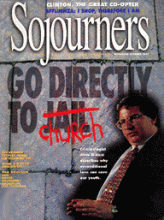Debates over "appropriate" styles of music used in worship settings demonstrate how important this aspect of liturgics is to the believer. Music challenges and provokes, as well as satisfies and comforts. Increasingly, cultural pressures about the "uses" of music are entering the life of the churcha blessing to some and a bane to others.
This article offers examples of the church's choices as it seeks to deepen its mission as an advocate of the beauty of God's created order and humankind's creativity. The Editors
"Try to imagine how your priest might react," wrote Keith Shafer in The Living Church, "if a group of parishioners said, 'We think your sermons are too intellectual. We know you have a seminary education, but we've been watching the television evangelists, and frankly, they involve us emotionally. So we'd like you to begin preaching in a more folksy style. We're confident that you'll see how popular this sort of thing is, and that it will increase attendance at services. And please don't be inflexible...if you don't go along with us, we'll find someone who will.'"
Shafer, a church musician, was responding to the pressure under which many music ministers find themselves to accommodate what they see as an ill-considered demand for third-rate church music. And there is a strong case to be made that banal and frivolous music bespeaks a banal and frivolous theology. What does our sacred music say about the Most High? Does it say with Thomas, "My Lord and my God," or rather, as Thomas Day put it in Why Catholics Can't Sing, "Have a nice day, God!"?
Read the Full Article
